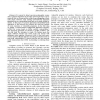Free Online Productivity Tools
i2Speak
i2Symbol
i2OCR
iTex2Img
iWeb2Print
iWeb2Shot
i2Type
iPdf2Split
iPdf2Merge
i2Bopomofo
i2Arabic
i2Style
i2Image
i2PDF
iLatex2Rtf
Sci2ools
109
click to vote
ICNP
2007
IEEE
2007
IEEE
Network-based and Attack-resilient Length Signature Generation for Zero-day Polymorphic Worms
—It is crucial to detect zero-day polymorphic worms and to generate signatures at the edge network gateways or honeynets so that we can prevent the worms from propagating at their early phase. However, most existing network-based signatures generated are not vulnerability-based and can be easily evaded by attacks. In this paper, we propose generating vulnerability-based signatures on the network level without any host-level analysis of worm execution or vulnerable programs. As the first step, we design a network-based Length-based Signature Generator (LESG) for worms based on buffer overflow vulnerabilities1 . The signatures generated are intrinsic to buffer overflows, and are very hard for attackers to evade. We further prove the attack resilience bounds even under worst case attacks with deliberate noise injection. Moreover, LESG is fast and noisetolerant and has efficient signature matching. Evaluation based on real-world vulnerabilities of various protocols and real network t...
| Added | 03 Jun 2010 |
| Updated | 03 Jun 2010 |
| Type | Conference |
| Year | 2007 |
| Where | ICNP |
| Authors | Zhichun Li, Lanjia Wang, Yan Chen, Zhi Fu |
Comments (0)

